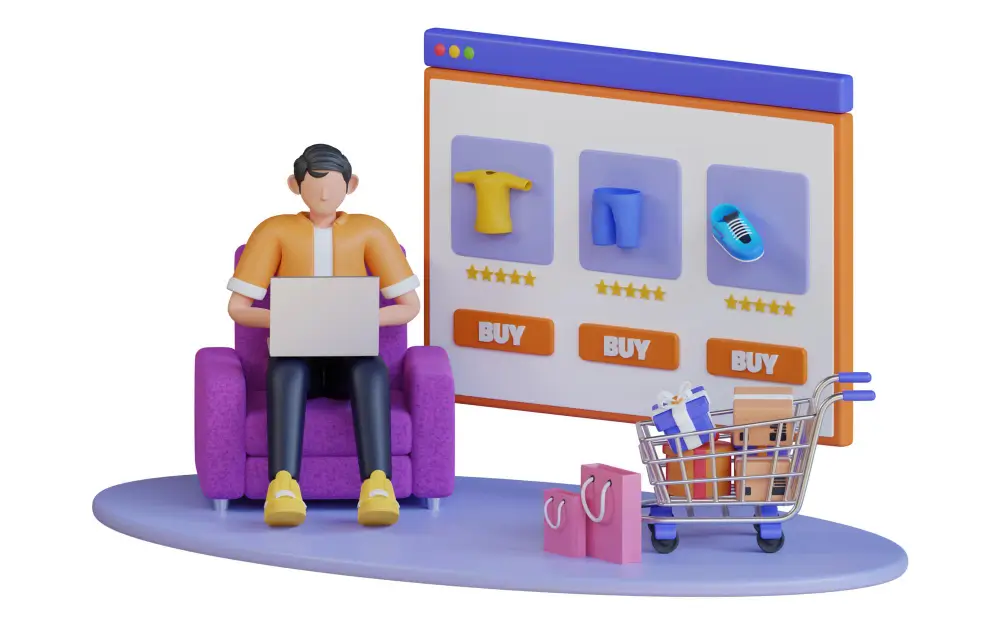Launching an online store is exciting — but it can also feel overwhelming. Beyond choosing products and designing your storefront, you need the right platform to manage it all. The best CMS for online shop is the tool that helps you create a professional-looking site, manage products, process payments, and scale as your business grows.
With so many options available — from Shopify to WooCommerce to BigCommerce — how do you know which one fits your goals and budget? The answer depends on your business size, technical skills, and the features you need most.
How I picked the top eCommerce CMS platforms?
When evaluating the best CMS for online shop, I considered the needs of both beginners launching their first store and established businesses looking to scale. Here are the key criteria I used:
1. Ease of Use
The best eCommerce CMS should make it simple to add products, manage orders, and update content — without requiring advanced technical skills.
2. Customization Options
Every online shop is unique. A strong CMS must offer flexible design options, plugins, or extensions so you can tailor your store to your brand.
3. E-Commerce Features
Core features like inventory management, secure payment gateways, shipping tools, and product variations are non-negotiable.
4. Scalability
Your CMS should grow with your business, whether that means handling more products, more customers, or more integrations as you expand.
5. SEO and Marketing Tools
From product page optimization to email marketing integrations, the right CMS helps you attract and convert customers — not just list items for sale.
6. Cost and Value
I considered both upfront and ongoing costs (hosting, themes, transaction fees) to make sure the platforms fit small to mid-sized business budgets.
7. Support and Community
Responsive customer support, documentation, and active user communities can make the difference between a smooth launch and a stalled project.
Bottom line: The platforms I selected are those that balance ease of use, powerful e-commerce features, and scalability — so you can focus on selling, not wrestling with your website.
Key features of a CMS for eCommerce
Not all CMS platforms are built with online stores in mind. The best CMS for an online shop should combine ease of use with powerful selling tools. Here are the must-have features to look for:
1. Product Management
- Ability to add, edit, and organize products easily.
- Support for variations (sizes, colors, bundles).
- Inventory tracking to prevent overselling.
2. Secure Payment Integration
- Multiple payment gateways (credit cards, PayPal, Stripe, etc.).
- SSL support for safe transactions.
- Option for local and international payment methods.
3. Order and Shipping Management
- Built-in tools for order processing, fulfillment, and returns.
- Shipping calculators, real-time rates, and integration with carriers.
- Automated email notifications for order updates.
4. Mobile Optimization
- Responsive designs that look great on any device.
- Mobile-friendly checkout to reduce cart abandonment.
5. SEO and Marketing Tools
- Customizable URLs, meta descriptions, and alt tags.
- Discount codes, coupons, and loyalty programs.
- Integrations with email marketing, social media, and analytics.
6. Scalability and Performance
- Ability to handle growing traffic and larger product catalogs.
- Fast page loading for better user experience and SEO rankings.
7. Multi-Channel Selling
- Options to sell directly on marketplaces like Amazon, eBay, or Facebook.
- Synchronization of inventory across all sales channels.
8. Security and Compliance
- Regular updates and patches.
- PCI DSS compliance for payment security.
- GDPR-ready data handling for customer protection.
9. Customization and Extensions
- Themes or templates to match your brand identity.
- Plugins, apps, or modules to add advanced features.
10. Support and Documentation
- 24/7 customer support (chat, email, or phone).
- Active user communities and tutorials to troubleshoot quickly.
Pro tip: Before committing to a CMS, make a checklist of your must-have features versus “nice-to-haves.” This helps you choose the best fit for your shop’s current needs and future growth.
Read:
Best cms for online shop

The best CMS for online shop depends on your business model, technical skills, and growth plans. Here are the top platforms worth considering:
1. Shopify
- Best for: Beginners and growing businesses that want an all-in-one solution.
- Pros:
- Easy setup with hosting included.
- Secure checkout and multiple payment gateways.
- Rich app marketplace for added features.
- Cons:
- Monthly fees add up.
- Less customizable than open-source platforms.
2. WooCommerce (on WordPress)
- Best for: Businesses that want full control and flexibility.
- Pros:
- Free plugin with thousands of extensions.
- Works seamlessly with WordPress for blogging and SEO.
- Highly customizable for unique store needs.
- Cons:
- Requires hosting and more technical setup.
- Security and maintenance are your responsibility.
3. BigCommerce
- Best for: Fast-growing shops with large catalogs.
- Pros:
- Built-in multi-channel selling (Amazon, eBay, social media).
- Advanced analytics and reporting.
- Strong scalability without heavy reliance on plugins.
- Cons:
- Steeper learning curve than Shopify.
- Pricing tiers can increase quickly as sales grow.
4. Magento (Adobe Commerce)
- Best for: Enterprises or businesses with complex e-commerce needs.
- Pros:
- Extremely powerful and customizable.
- Advanced product, order, and customer management.
- Ideal for large-scale, high-traffic stores.
- Cons:
- Requires developer expertise.
- Hosting and maintenance can be expensive.
5. Squarespace Commerce
- Best for: Small shops with a focus on design.
- Pros:
- Sleek, professional templates.
- All-in-one solution with hosting.
- Simple to set up for small catalogs.
- Cons:
- Limited scalability for larger stores.
- Fewer advanced e-commerce tools than Shopify or WooCommerce.
Quick recommendation:
- For ease of use and speed, choose Shopify.
- For control and SEO, go with WooCommerce.
- For scaling quickly, try BigCommerce.
- For enterprise power, pick Magento.
- For small, design-driven shops, use Squarespace Commerce.
Also read:
How to choose the right CMS for your eCommerce business?
With so many options, picking the best CMS for your online shop comes down to your specific needs. Here’s a step-by-step approach to help you make the right choice:
1. Define Your Business Goals
- Are you launching a small boutique shop or scaling to thousands of products?
- Do you need global reach with multi-language support, or will you focus locally?
2. Assess Your Technical Skills (or Team’s)
- If you want a no-code, beginner-friendly option, Shopify or Squarespace Commerce may be best.
- If you have a developer or technical background, WooCommerce or Magento gives more customization.
3. Budget for Costs Beyond the CMS
- Factor in hosting, payment processing fees, themes, extensions, and maintenance.
- Subscription-based solutions like Shopify or BigCommerce include hosting but may cost more monthly.
4. Check for Scalability
- Choose a CMS that won’t limit your growth.
- For high growth, platforms like BigCommerce or Magento are better suited than simpler tools.
5. Prioritize SEO and Marketing Tools
- Look for platforms with strong SEO features, blogging support, and marketing integrations.
- WooCommerce and WordPress excel in content-driven e-commerce.
6. Consider Integrations and Ecosystem
- Does the CMS integrate with your payment gateways, accounting software, shipping providers, or CRM?
- A large plugin or app marketplace can save you time and development costs.
7. Evaluate Support and Community
- Responsive customer support is vital when running a store.
- Active communities (like WordPress and Shopify) provide tutorials, plugins, and troubleshooting help.
Pro tip: Start by listing your must-haves (e.g., payment gateways, SEO tools, inventory management) and nice-to-haves (loyalty programs, subscriptions). Then compare CMS platforms against that list to find the perfect fit.
Why you need a separate CMS to manage your eCommerce store?
Running an online shop is more than just listing products. Without the right system, managing inventory, updating content, and scaling your store can quickly become overwhelming. That’s where a separate CMS for eCommerce makes a big difference.
1. Centralized Content and Product Management
Instead of juggling spreadsheets, emails, and separate tools, a CMS gives you one central hub to manage product details, prices, images, and descriptions.
2. Consistency Across Channels
If you sell on multiple platforms (your website, Amazon, social media), a CMS helps keep product information consistent and updated everywhere.
3. Improved Customer Experience
From smooth navigation to faster checkouts, an eCommerce CMS is designed to optimize the entire buying journey — which directly impacts sales.
4. Scalability as You Grow
A CMS grows with you. Whether you start with 10 products or expand to 10,000, the right platform ensures performance and organization don’t suffer.
5. Built-in Security and Compliance
eCommerce CMS platforms are built with security in mind. They handle PCI compliance, SSL, and regular updates to keep customer data safe.
6. Marketing and SEO Benefits
A CMS allows you to integrate SEO tools, email campaigns, and discount codes right into your store, helping you attract more customers and increase repeat purchases.
Bottom line: A separate CMS is not just about convenience — it’s about giving your business the tools to manage, scale, and secure your online store effectively, while freeing you to focus on sales and growth.
Suggested:
ECommerce CMS features checklist
When choosing the best CMS for an online shop, make sure your platform covers these essential features. Use this checklist to evaluate options before you commit:
Product & Inventory Management
- Add, edit, and categorize products easily.
- Support for product variations (size, color, bundles).
- Real-time inventory tracking and stock alerts.
Shopping Cart & Checkout
- Secure, mobile-friendly checkout process.
- Guest checkout and account creation options.
- Abandoned cart recovery tools.
Payment & Security
- Multiple payment gateways (credit cards, PayPal, Stripe, local options).
- SSL certificate support for secure transactions.
- PCI DSS compliance for payment processing.
Order & Shipping Management
- Automated order confirmations and status updates.
- Integration with major shipping carriers.
- Flexible shipping rates, taxes, and return management.
SEO & Marketing Tools
- Customizable URLs, titles, and meta descriptions.
- Built-in blogging or content marketing features.
- Discount codes, coupons, and loyalty programs.
- Integrations with email marketing and social media.
Design & Customization
- Responsive templates for mobile and desktop.
- Easy customization to reflect your brand identity.
- App/plugin marketplace for extra features.
Analytics & Reporting
- Dashboard with sales reports and customer insights.
- Google Analytics and third-party integrations.
- Conversion tracking for campaigns and promotions.
Scalability & Performance
- Handles traffic spikes without downtime.
- Supports growing catalogs and high order volume.
- Cloud hosting or CDN support for speed.
Multi-Channel & International Selling
- Sync products with Amazon, eBay, or Facebook Shops.
- Multi-language and multi-currency support.
- Localized tax and shipping rules.
Support & Community
- 24/7 customer support (chat, phone, or email).
- Active community forums and tutorials.
- Regular updates and security patches.
Pro tip: Print this checklist or save it as a template. As you test different CMS platforms, tick off the boxes to see which solution fits your current needs — and your future growth.
FAQ
1. What is an eCommerce CMS?
An eCommerce CMS (Content Management System) is a platform that allows you to create, manage, and run an online store without coding everything from scratch. It handles products, orders, payments, and design in one place.
2. Which CMS is best for online shops?
The best CMS depends on your needs:
- Shopify → All-in-one, beginner-friendly.
- WooCommerce → Flexible, open-source, great for WordPress users.
- BigCommerce → Scalable with built-in enterprise features.
- Magento (Adobe Commerce) → Powerful for large, complex stores.
- Squarespace Commerce → Ideal for small, design-focused shops.
3. Is WordPress good for eCommerce?
Yes. With the WooCommerce plugin, WordPress becomes a full-featured online shop platform. It’s great for small to medium businesses that want strong SEO and control over their store.
4. Which CMS is easiest to use for beginners?
Shopify and Squarespace Commerce are the easiest. Both are hosted solutions with drag-and-drop tools, so you don’t need coding or hosting setup.
5. How much does an eCommerce CMS cost?
- Shopify: $29–$299/month.
- WooCommerce: Free core plugin, but hosting and extensions add ~$10–$50/month.
- BigCommerce: $29.95–$299.95/month.
- Magento: Free open-source version, but hosting and development costs can be high.
- Squarespace Commerce: $27–$49/month.
6. Can I change my CMS later?
Yes, but migrating can be challenging and time-consuming. It’s best to choose a CMS that fits both your current needs and future growth to avoid costly migrations.
7. Do I need technical skills to run an eCommerce CMS?
Not always. Hosted solutions like Shopify and Squarespace require no technical skills. Open-source platforms like WooCommerce or Magento offer more flexibility but require more setup and maintenance.
Conclusion
Choosing the best CMS for your online shop is one of the most important decisions you’ll make when starting or scaling your eCommerce business. The right platform doesn’t just showcase your products — it gives you the tools to manage inventory, process payments securely, attract customers, and grow sustainably.
- If you want simplicity and speed, Shopify or Squarespace Commerce are excellent choices.
- If you need flexibility and strong SEO, WooCommerce on WordPress is hard to beat.
- For scalability and enterprise power, BigCommerce or Magento are better suited.
There’s no one-size-fits-all solution — the best CMS is the one that aligns with your business goals, technical skills, and budget.
Next step: Make a checklist of your must-have features, try out a demo or free trial, and pick the CMS that empowers you to focus less on tech headaches and more on building a profitable online store.



